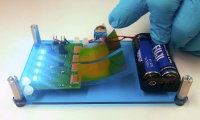Metacapacitors for LED Lighting

Technology Description:
City University of New York (CUNY) Energy Institute is developing less expensive, more efficient, smaller, and longer-lasting power converters for energy-efficient LED lights. LEDs produce light more efficiently than incandescent lights and last significantly longer than compact fluorescent bulbs, but they require more sophisticated power converter technology, which increases their cost. LEDs need more sophisticated converters because they require a different type of power (low-voltage direct current, or DC) than what’s generally supplied by power outlets. CUNY Energy Institute is developing sophisticated power converters for LEDs that contain capacitors made from new, nanoscale materials. Capacitors are electrical components that are used to store energy. CUNY Energy Institute’s unique capacitors are configured with advanced power circuits to more efficiently control and convert power to the LED lighting source. They also eliminate the need for large magnetic components, instead relying on networks of capacitors that can be easily printed on plastic substrate. CUNY Energy Institute’s prototype LED power converter already meets DOE’s 2020 projections for the energy efficiency of LED power converters.
Potential Impact:
If successful, CUNY Energy Institute’s capacitors and advanced power circuits would lead to flexible, efficient, and reconfigurable power supplies for many types of electronic devices, including energy-efficient LED lights.
Security:
This project could contribute to a smarter, more advanced, and more reliable power grid.
Environment:
This project could drive adoption of energy-efficient lighting—reducing electricity use and harmful emissions.
Economy:
This project could cut the cost of an LED circuit in half, reducing the cost of energy-efficient lighting for consumers. The market for these types of converters is expected to grow to $4.3 billion by 2016.
Contact
ARPA-E Program Director:
Dr. Timothy Heidel
Project Contact:
Prof. Steven O'Brien
Press and General Inquiries Email:
ARPA-E-Comms@hq.doe.gov
Project Contact Email:
sobrien@ccny.cuny.edu
Partners
University of California, Berkeley
Columbia University
Related Projects
Release Date:
03/02/2010
